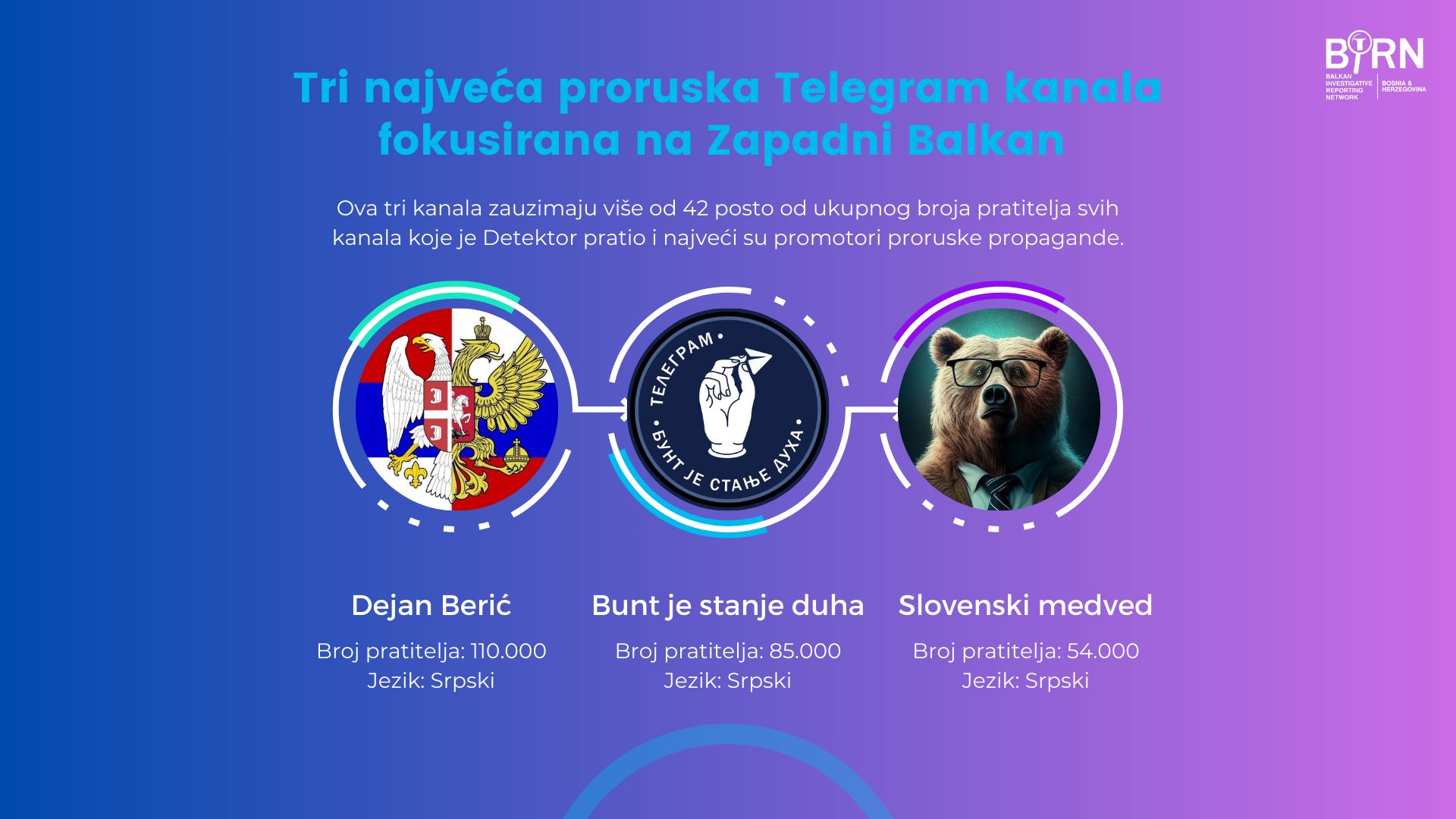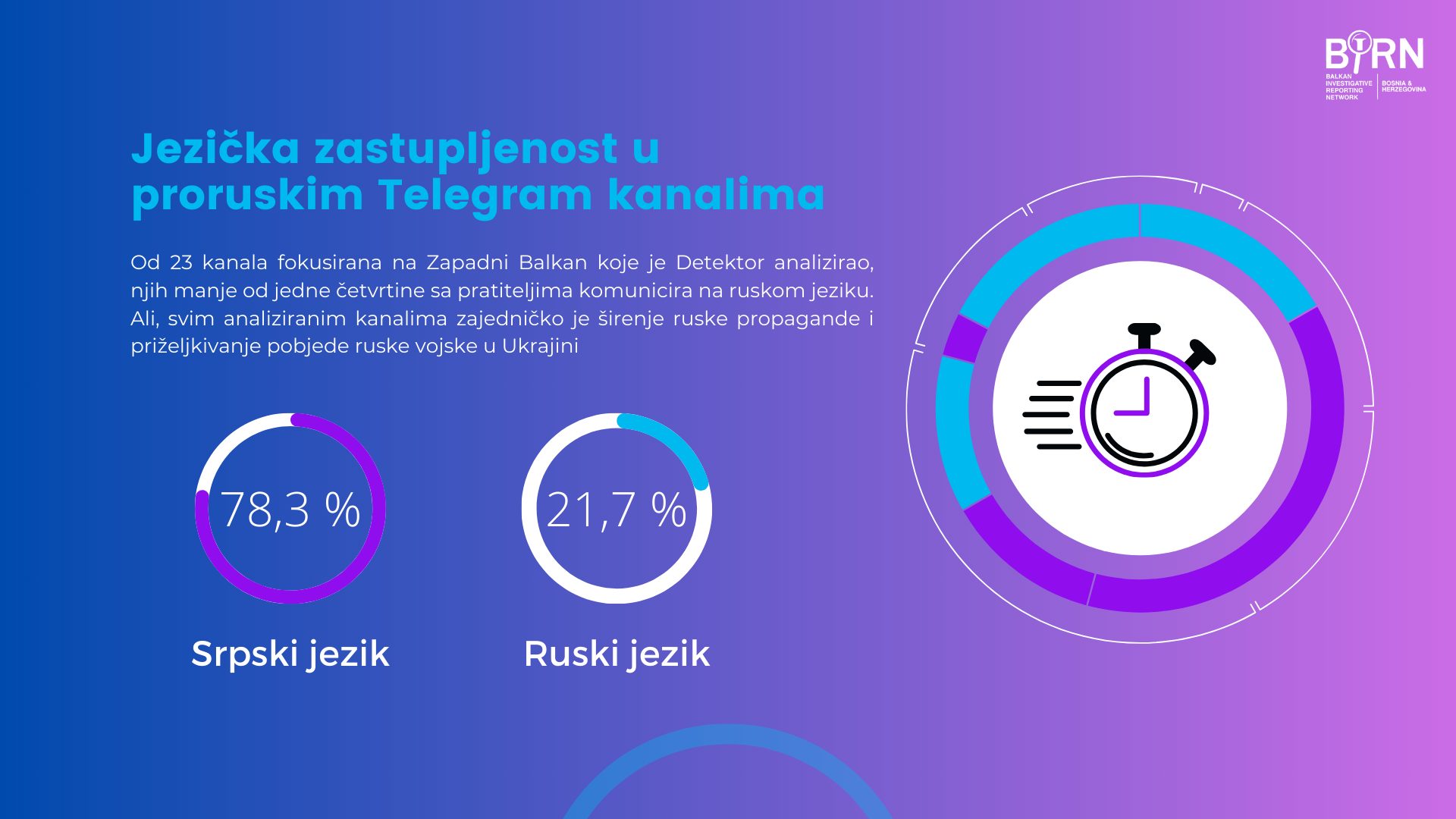This post is also available in: Bosnian
In less than a year and a half, the ‘Slovenski Medvedi’ Telegram channel has attracted more than 50,000 followers by posting thousands of videos and tens of thousands of photos of events that Russia wants Serbian citizens to know about.
This channel, created in January 2023, a year after the start of the Russian invasion of Ukraine, wants to be “the voice of Russia in Serbia and the voice of the Serbian people”. It is one of the fastest growing pro-Russian Telegram channels and in one of its recent posts, published to more than 54,000 followers, it collected money for Russia’s war in Ukraine.
“You can support the guys from the 4th Brigade and take part in the fund-raising activity for the purchase of a quadcopter as part of the People’s Front’s All for Victory project,” the post reads.
Recently, members of the People’s Front political coalition, founded by Russian president Vladimir Putin, have been visiting Republika Srpska, developing close ties with the Visegrad mayor and paying respect to Russian volunteers in the Bosnian Serb Army from the 1992 conflict.
In just over a year, the channel published nearly 30,000 photographs and 8,000 videos. It is linked with 65 other, similar channels, promoting the Russian invasion and sharing content referring to Republika Srpska, Kosovo and Russia.
In recent months, the content has been cross-shared from the ‘Permski Medvedi’ closed channel, whose administrator was Dario Ristic, a Bosnian citizen who departed to the frontline in Ukraine, as Detektor revealed in a recent investigation. Alongside him, the channel was also managed by some Serbian citizens.
These channels are part of a growing trend of using the Telegram communication application instead of social media networks to spread Russian disinformation and recruit fighters from the Western Balkans, which Detektor journalists noted while monitoring Russian Telegram channels. Although not a new phenomenon, the number of channels and frequency of publication seem to have increased since the onset of the Russian invasion of Ukraine. Telegram has proved to be the most successful platform to spread different types of disinformation as a result of its weak content restrictions. The messages include calls to support Russia, media content from the battlefront and attempts to mobilise citizens of Western Balkan countries to become involved in “the fight against the West”.
Using analytical tools such as Telemetrio and TGstat, Detektor journalists have singled out the 23 most popular channels and analysed their content and mutual interactions.
Some of those channels were founded in Russia, and they publish in Russian language or use Russian state media as their main sources of information, but are oriented towards a Western Balkan audience.
Experts from Serbia, where the majority of channels analysed by Detektor were created, explain that, regardless of the location where they were founded, such Telegram channels are very much dedicated to Bosnia, especially to spreading their influence in Republika Srpska.
 Illustration. Photo: Detektor
Illustration. Photo: Detektor
Digital forensic expert Natasa Kilibarda told Detektor that Telegram has become a fertile soil for Russian influence in the Western Balkans, mostly through so-called information operations, adding that their interconnection is not accidental.
“Telegram channel admins become literal influencers of propaganda and warmongering activities,” she said.
“The interconnection and mutual promotion of channels is well-coordinated and orchestrated, with a clearly articulated narrative,” Kilibarda explained, adding that, by rule, the content was pro-Russian, anti-Ukrainian, anti-Western, anti-LGBT, and against the Resolution about Srebrenica and Kosovo independence.
She points out that the influence of Telegram influencers should be considered a matter of national security because of radicalisation and extremism.
Kilibarda also points out that over the course of Telegram’s ten years, not once has the platform provided digital addresses and phone numbers to law enforcement, despite its policy that it will do so in cases of suspected terrorism.
While other social media networks, like Meta’s Facebook and Instagram, cooperate with police services worldwide in eliminating criminal activities from their platforms, Telegram has devoted only three sentences out of 15 pages of its privacy policy to this topic.
“On the other hand, we are witnesses that Telegram is used as means of communication and mobilisation by numerous actors whose criminal activity, either direct or indirect, but largely unprovable, has led to numerous adverse effects on security, be it national or individual,” Kilibarda said.
Calling people to join foreign military and paramilitary formations is prohibited under the law in Bosnia and Serbia, but a significant number of Telegram channels continue to encourage volunteers to go to the war in Ukraine. Dario Ristic from Modrica used Telegram to report on his journey to the frontline in Ukraine.
Kilibarda explains that Telegram, in addition to VKontakte, is the only social media the Russian Government has approved for its army.
“Taking all that into consideration, we get a hint at least that the Kremlin has engaged in conversations on Telegram since long ago, but also that Telegram as such has long since provided a route for different sorts of abuses, and even extremism and terrorist activities,” she said.
First among equals: Beric and rebels
 Illustration: EPA
Illustration: EPA
Dejan Beric is one of the best-known Serb volunteers in the Russian Army. His channel is the most visited pro-Russian Telegram channel in the territory of Bosnia and Herzegovina, Serbia and Montenegro. It has more than 110,000 followers, publishing about 100 posts a day, and its content is viewed by 25,000 followers every 24 hours. The channel devotes most of its quotes to other pro-Russian channels, such as ‘Bunt Je Stanje Duha’ and ‘Ocilo’ , as well as other Russian media outlets, such as Sputnik.
It is the most popular Telegram channel in Serbian. Its outreach is considerably higher than the number of followers. In January, February and March 2024, Beric’s channel reached nearly a million people through sharing on other channels. In that period, its followers increased by almost 5,000.
The most popular posts over the past few weeks, which have had several tens of thousands of views, are devoted to Serbian-Russian brotherhood, the Orthodox Church, glorification of the Russian invasion against Ukraine and criticism of NATO.
Since 2020, the ‘Bunt’ channel has served to spread pro-Serbian and pro-Russian propaganda. It was originally started under the name of ‘Bunt Montenegro’, but a year later it was given its current name.
The number of new members rose sharply since the start of the Russian Federation’s invasion of Ukraine in February 2022, when it increased by nearly 30,000 in just a few weeks. It is now followed by more than 85,000 people.
Kilibarda says that a number of pro-Russian channels appeared in the spring of 2022, directing a large part of their propaganda activities towards the Western Balkans.
“It is no longer a secret that Telegram, as a platform, is becoming increasingly popular among right-wingers, extremists, disinformation agents and conspiracy theorists,” Kilibarda says.
Telegram is expected to reach its first billion active users soon.
“That growth happened for at least three reasons: migration of users from Facebook, Messenger and WhatsApp, distrust in mainstream media, which is also accompanied by a great interest in global social-political topics,” Kilibarda said.
Members of the ‘Bunt’ channel share content associated with the Russian invasion of Ukraine on a daily basis. A large part of the published content refers to Republika Srpska and military officials during the Bosnian war, including Ratko Mladic, former commander of the Bosnian Serb Army’s Main Headquarters. Mladic was sentenced to life imprisonment for the Srebrenica genocide and other crimes in Bosnia.
The term “Bosnia and Herzegovina” is mentioned 158 times on the channel, with at least 100 mentions made during the past year.
Besides being linked with ‘Bunt’, Dejan Beric’s channel is also linked with the ‘Srpski Vjesnik’ channel, Detektor’s investigation shows. Almost all channels analysed by Detektor were registered in Serbia.
Russian propaganda is felt throughout Serbia, says Sofija Todorovic, program director of the Youth Initiative for Human Rights in Serbia.
“In this new government, we have ministers who are openly pro-Russia oriented, so the question is how much we can classify certain narratives as propaganda dominantly coming from abroad knowing that such stances and views are represented and promoted by people holding important state government functions,” she said.
She added that many civil society organisations point to the harm caused by Russian propaganda, especially because it “plays around with the still open wounds in the region, using victims and animosity in an extremely malicious way devoid of ethics and dignity”.
The ‘Borbeni Efektivi’ channel is yet another fast-growing channel with more than 42,000 total followers. Created in 2018 under the name of ‘Bog Rata’ , ‘Borbeni Efektivi’ has frequently reached an audience of more than 200,000 people per month.
A considerable portion of posts published in May 2024 was devoted to the Resolution on the Srebrenica genocide.
More than 80 percent of posts referring to Republika Srpska, which include those glorifying war criminals, and 90 percent of posts in which they mention Bosnia and Herzegovina, have been published since the invasion of Ukraine.
During the past two years, Detektor has monitored dozens of Telegram channels with predominantly pro-Russian content. Their activity and popularity have increased significantly over the past few months, so using Telemetrio and TGstat analytical tools, Detektor paid attention to the 23 biggest channels and analysed when they were created and how fast they have developed, which content they most frequently publish and how much they are interconnected by networking.
Both sides of Drina
 One of the posts on “Slovenski medved” channel. Photo: Screenshot
One of the posts on “Slovenski medved” channel. Photo: Screenshot
The ‘Vojska Republike Srpske’ channel is devoted to “patriots and veterans of the Bosnian Serb Army”. Over the past months, it has seen an increased following. During one month alone it gathered several hundred new followers, and in the first five months of 2024 the number of followers rose by more than 2,000.
It was created two days after Russia invaded Ukraine under the name ‘Debeljača1’. A YouTube channel with the same name has more than 50,000 followers and its content is mostly devoted to the Bosnian Serb Army.
The channel publishes more than 40 posts per day. The content of this channel is mostly shared on other pro-Russian channels, such as ‘Kajzer Soze’ , ‘Srpski Svijet’ and ‘Srpska Sparta – Info’ .
The most widely read posts on the ‘Vojska Republike Srpske’ channel focus on backing the Russian invasion of Ukraine and glorification of convicted war criminals.
The description of the ‘Republika Srpska’ channel reads “Republika Srpska, Serbia, Russia, Belarus, Montenegro”. Conceptually similar to ‘Otkrivanje Istorije’ , it was created in April 2022 using the Latin alphabet, which was soon replaced by Cyrillic.
This channel features war videos from the Ukrainian battlefront from the perspective of the Russian Army and its interests, as well as official statements from Republika Srpska officials and anniversaries of wartime events. The channel content is most often shared on the ‘Srpski Svijet’ and ‘Srpska Sparta – Info’ channels.
Since its creation in May 2023, ‘Srpska Sparta – Info’ has attracted 12,000 followers, of which 70 percent are men. The posts are focused on events in Serbia and Kosovo, with Republika Srpska also frequently covered.
The channel also often published pro-Russian content, emphasising the brotherhood that exists between Russians and Serbs. The outreach of this channel can be illustrated by the fact that, through republications on channels such as ‘Republika Srpska’ and ‘Vojska Republike Srpske’, its posts reach up to 300,000 people a month, as happened in February 2024.
About Republika Srpska and Serbia in Russian language
 Illustration. Photo: Detektor
Illustration. Photo: Detektor
Created in 2019, ‘Balkanist’, a popular Telegram channel where Russian is the official language of communication, is also devoted to Bosnia and Herzegovina, specifically Republika Srpska. Since February 2021 and the onset of the invasion against Ukraine, ‘Balkanist’ has expanded its activities also to Yandex, a Russian version of the Google search engine, and YouTube, and created an official internet portal and podcast.
One of the advertising partners of this channel, whose followers have tripled in one year, is Platon Besedin, a Ukrainian-Russian author publicly known as a pro-Russian propagandist. In most cases, the ‘Balkanist’ channel shares his content.
The most popular content on the ‘Istok Info’ channel refers to the activities of the Russian Army in Ukraine. The Channel was created a few weeks after the beginning of the Russian invasion. Its content is most often shared on similar channels, such as ‘Srpski Vjesnik’, ‘Istocni Front’ , ‘Republika Srpska’ and ‘Srpski Svijet’.
‘Serbski Vestnik’ was initiated in September 2021. It is primarily devoted to a Russian audience and written in Russian, but it offers news about Serbia and the Balkans.
As explained in the channel description, it most often shares content related to Serbia and posts are often associated with events in Bosnia. It often includes certain anniversaries, especially from the war, and the term “Republika Srpska” was mentioned in 76 posts in May 2024. Owing to mutual content sharing, posts on this channel reached 1.8 million users in May.
Most posts shared by ‘Serbski Vestnik’ contain news from RT, the Russian state media outlet.
Todorovic says that RT publishes articles which disparage the work of certain civil society organisations, such as Youth Initiative. “Telegram channels represent one of very active means of spreading Russian propaganda and there are also different online portals presenting themselves as media, while actually not being registered as such, making it very hard to hold them legally accountable for their actions,” Todorovic said.
‘O Srbiji Na Ruskom’ channel is also linked with the Russian media. It was created in 2017 under the name ‘RuSerbia.com’, which is an official webpage of a media outlet of that name registered in the Russian Federation.
“Our goal is to quickly inform Russian-speaking users about the happenings in Serbia and other countries in the Balkan region, to strengthen the cultural and economic cooperation,” the description of ‘RuSerbia.com’ webpage reads.
The channel has 11,300 followers. It most often quotes other pro-Russian channels, such as ‘Serbski Vestnik’, ‘Balkanska Spletnica’ and ‘Russie Z’.
The phrase “Bosnia and Herzegovina” is mentioned on the channel more than 900 times, including as many as 250 times in the last 12 months only. Although “Republika Srpska” is mentioned more than 1,300 times during the seven years of the channel’s existence, it has been mentioned more and more frequently in the past 12 months, with as many as 500 mentions being recorded.
War live on air and genocide denial
‘Zli Orlovi’ , another channel promoting the Russian-Serbian world, was created a few days after Russia invaded Ukraine. The channel’s author is Alexander Lisov, director of ‘Orlovi’ Russian – Serbian Center, which was registered in Saint Petersburg in November 2017, according to an investigation by Radio Free Europe and maintains contacts with representatives of the Serbia’s ruling Serbian Progressive Party, SNS, and has also met with Arnaud Gouillon, former member of Generation Identity – the French extreme right group, which the French authorities banned in 2021. Gouillon is now director of the Office for Cooperation with the Diaspora and Serbs in the Region with the Ministry of Foreign Affairs of Serbia.
‘Rat Uzivo’ channel, whose name is decorated with flags of Russia and Ukraine, is a Serbia-based channel and its primary language is Serbian. With more than 21,000 followers, the channel has almost doubled its audience in the past year.
The channel was created in October 2022. In recent weeks, it has spread pro-Russian and pro-Serbian propaganda by writing about protests in Georgia against the Russia-inspired Law on Foreign Agents and news about the Srebrenica Genocide Resolution.
The most popular post is about Russia’s invasion of Ukraine, glorifying soldiers of ‘Espanola’, a notorious Russian military formation fighting in Ukraine, whose members are inspired by the Tigers paramilitary group which was led by Zeljko Raznatovic Arkan during the 90s wars in Croatia and Bosnia.
The content of the ‘Istocni Front’ channel, which was also created a few days prior to Russia’s invasion of Ukraine, is shared by other popular channels whose authors come from Serbia or the region, including a channel devoted to ‘Mi, Snaga Naroda’ party led by Serbian politician and conspiracy theorist Branimir Nestorovic.
Kilibarda says that previous analyses by digital forensics show how networks of channels with the same names are being formed.
“So, it was shown that, for instance, ‘InforDefSerbian’ network operates successfully in Serbian language too, spreading digital propaganda, disinformation and misleading content,” she said.
‘InfoDefenseSERBIA’ is the propaganda channel of the most famous Russian military blogger – Yuri Podolyaka. He is an ethnic Ukrainian who was sentenced in absentia to 15 years in Ukraine for spreading Russian propaganda. The channel was founded in October 2022 and has more than 14,000 members. Its entire content is translated from Russian and Ukrainian to Serbian language.
The most popular content was published on May 15, when there was a large-scale military operation by the Russian Army in the East of Ukraine, about which it reported live from the scene.
It seems that those channels are becoming increasingly important for Russian authorities and their proxies. Recently, the ‘Rybar’ Russian Telegram channel, which has more than a million followers, bragged about organising training for managing and networking Telegram channels for 500 participants, including students, journalists, politicians and scholars, in Serbia and Republika Srpska.
The channel was established by Mikhail Sergeevich Zvinchuk, former member of the Russian Defence Ministry’s press office, whom Ukraine and the EU have put under sanctions. In an interview with RTVI in 2022, he said that 40 full-time employees managed the channel.
In its post, ‘Rybar’ stated that Zvinchuk personally held closed training sessions on how to use Telegram and avoid X, Facebook and Instagram. They wrote that they had chosen ten prospective projects and agreed on new face-to-face training.




